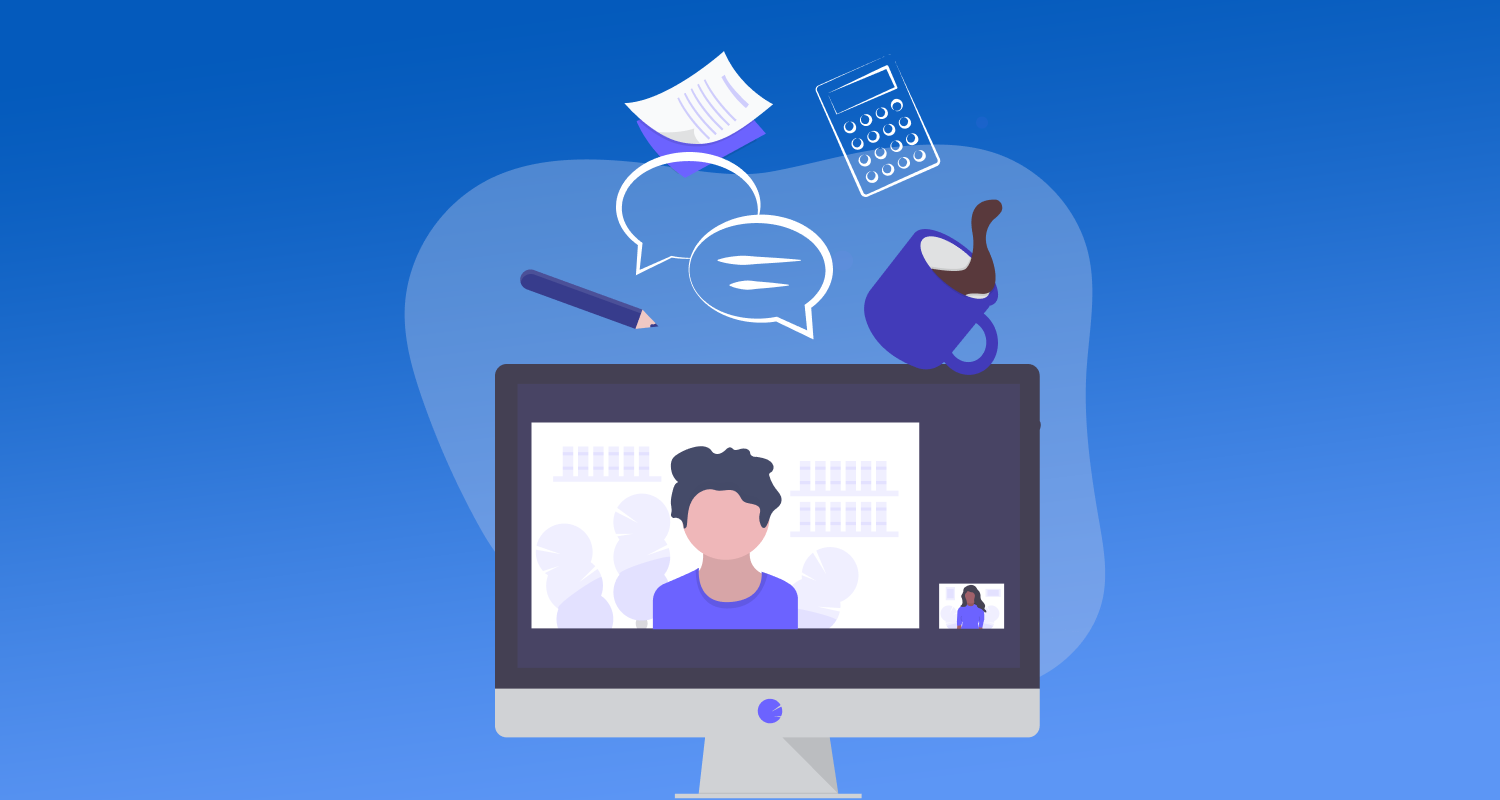The Five Ws of AI in Consulting: The Future of Consulting is Here
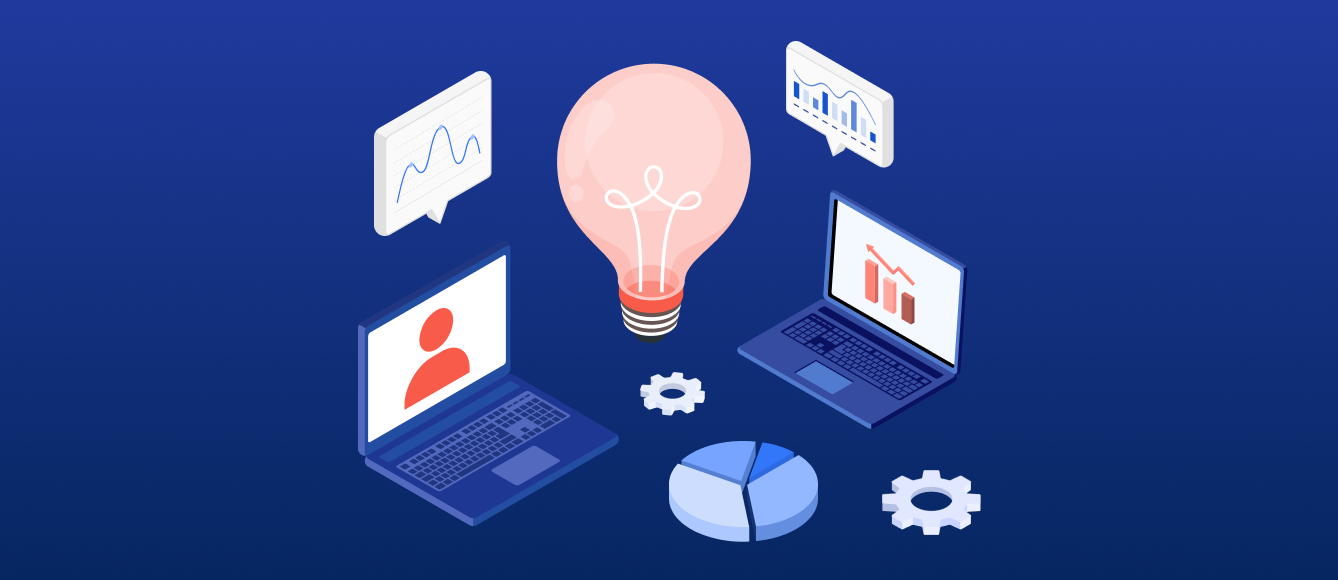
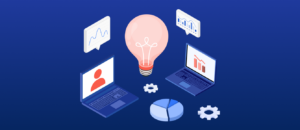

The market of AI consulting is growing rapidly, with forecasts indicating it will reach a value of $72.5 billion by 2025, growing at a compound annual growth rate (CAGR) of 40.3% from 2020 to 2027.
AI is transforming industries with advanced automation, data-driven decision-making, and new business models. From finance and healthcare to manufacturing and retail, organizations are leveraging AI for efficiency and competitive advantage. As businesses integrate AI into their strategies, they face significant challenges, including skills shortages, ethical concerns, and technical implementation hurdles.
However, the pace of AI adoption varies, with some companies struggling to implement AI effectively due to a lack of internal expertise and strategic guidance. Consulting firms are stepping in to bridge these gaps, but they must evolve quickly to keep up with the rapid changes in AI-driven business models. This creates a need for AI consultants who can help companies navigate AI integration and optimize their investments.
This article will explore the ‘Five Ws’ of AI in Consulting:
- Why: Why is AI unlocking new levers of efficiency in consulting, and how is it improving productivity and decision-making?
- How: How is AI redefining consulting workflows across contracting, execution, and closing phases?
- What: What AI-driven capabilities are reshaping consulting, from automating deliverables to enhancing recruitment?
- Where: Where is AI adoption driving the most growth across industries, regions, and consulting functions?
- Who: Who are the new key AI-driven professionals, and how can consulting firms bridge AI talent gaps?
The “Why”: AI Unlocks New Levers of Efficiency in Consulting
AI-powered management consulting has redefined the way consulting projects are approached. Traditional and Generative AI have revolutionized consulting by automating routine and repetitive tasks, allowing consultants to focus on high-value strategic work. AI disruptions have already been enabled:
- 70% reduction in programming time, according to Microsoft.
- 44% time-saving in professional writing tasks, according to MIT studies.
- 50% time reduction for accountants, auditors, and tax preparers on most tasks, as reported by UPenn.
On average, the application of AI in consulting improves operational efficiency by 35%, despite challenges—only 30% of projects are deemed entirely successful by clients. In this sense, the consulting industry has a significant responsibility to accelerate innovation by helping organizations define the pathways to adopt AI.
For instance, AI-powered large language models (LLM) and natural language processing (NLP) capabilities have the potential to unlock new levels of efficiency and accuracy, revolutionizing the way that business has been traditionally conducted.
As the C-suite attempts to navigate through the challenges of this disruption, consulting firms need to help:
- Ideate and experiment with new ideas, assess the right fitment, timing, and pace for adoption, and scale up the use of Generative AI.
- Assure their workforce that the advent of the age of Generative AI will not result in job cuts—rather, it will create upskilling opportunities and new job roles involving a higher degree of ‘human way of thinking.’
- Assure the C-suite that the technology does not threaten their jobs but rather has the potential to be an enabler.
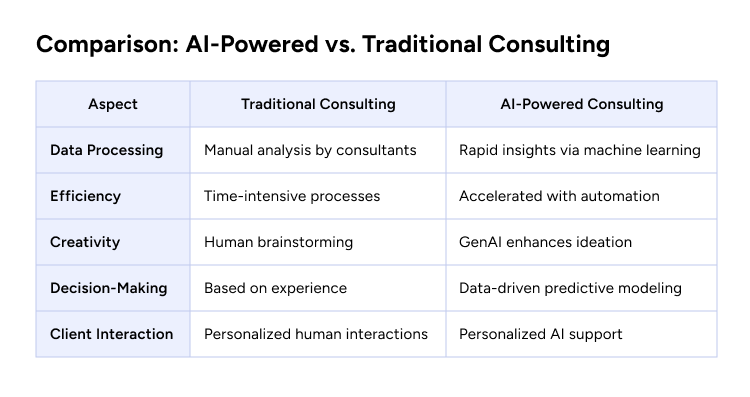
The “How”: AI's Expanding Role in Management Consulting
How AI is Redefining Consulting Workflows
To explore how AI is redefining management consulting workflows, it is useful to analyze its impact on the Management Consulting Process phases outlined by ISO 20700: Contracting, Execution, and Closing.
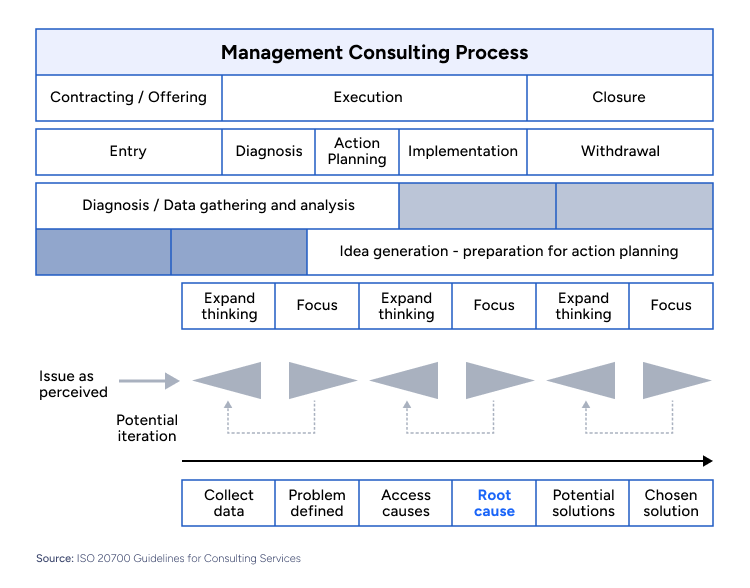
#1 Contracting
In the contracting phase, AI streamlines the initial steps of a consulting project by automating data analysis and hypothesis generation. AI tools process diverse inputs, such as historical client data, meeting transcripts, and financial reports, to highlight inefficiencies and potential areas for improvement.
This accelerates the process of defining the project scope and identifying key objectives. Additionally, AI-generated hypotheses provide consultants with a starting point for discussions, ensuring proposals are backed by data rather than intuition. AI also supports consultants with contract drafting by auto-generating templates that include deliverables, acceptance criteria, and compliance with industry standards. Enabling consultancies to save time and reduce errors in the foundational stages of consulting projects.
#2 Execution
During the execution phase, AI drives efficiency in consulting projects by automating repetitive administrative tasks, such as updating CRM systems, preparing meeting materials, and generating documentation. Thus, AI enables consultants to focus on high-value activities like strategic analysis and client interaction.
AI also accelerates market research by synthesizing large datasets in seconds, uncovering trends and risks that might otherwise go unnoticed. AI tools also help enhance decision-making by summarizing complex models and identifying anomalies or outliers in real-time. These capabilities improve project timelines and ensure that strategies remain aligned with client goals, even as unexpected challenges arise.
#3 Closing
In the closing phase, AI optimizes project wrap-up by automating quality assurance processes and benchmarking results. AI tools cross-reference deliverables with initial contracts to ensure alignment and flag discrepancies, reducing the likelihood of disputes.
Additionally, generative AI automates the creation of client-ready presentations, complete with data visualizations and summaries, saving significant time for consultants. It also benchmarks project outcomes against industry standards and historical data, identifying lessons learned that can improve future projects.
The Key: Human-AI Collaboration
The use of AI in consulting is not about replacing consultants; it’s about empowering them. Management consulting presents many opportunities for AI integration, spanning enhanced decision-making and improved knowledge management.
AI tools are increasingly utilized to amplify consultants' capabilities, yet their impact varies across different types of consulting projects, with some areas having greater advantages than others. Let’s delve into it.
The “What”: AI-Driven Capabilities
To maximize the potential of AI, consulting firms need to have a clear understanding and mapping of all the potential solutions it offers. Firms that strategically embrace AI's disruptive potential are likely to achieve a lasting competitive edge, while those that ignore or mishandle it may struggle to remain relevant.
Automating Deliverables
Innovative tools like ProAI's Pro Business Plans, Google Duet, and Notion AI enable management consultants to quickly compile research data, market analyses, and strategy insights into polished deliverables such as reports and presentations. These tools significantly reduce time spent on documentation, allowing consultants to focus on high-value client interactions.
24/7 Client Support
AI-powered chatbots like Claude.ai enable firms to provide round-the-clock, personalized support. These bots handle routine inquiries, gather feedback, and schedule meetings efficiently, leaving consultants free to address complex issues.
That said, bots lack human nuance and the ability to build rapport, making balancing automated and human interactions important. Transparency is key—clients should know when they’re interacting with a bot versus a consultant to maintain trust.
Enhanced Recruitment
AI recruiting tools analyze resumes, interviews, and performance data to identify top candidates more efficiently, expanding talent pools and reducing costs. However, human oversight remains critical to assessing cultural fit, soft skills, and other intangible qualities that algorithms may overlook. AI should support—not replace—human judgment in hiring decisions.
Streamlining Operations
Platforms like Monday.com AI and ClickUp AI streamline routine tasks such as meeting preparation, CRM updates, and project coordination, enhancing productivity and job satisfaction by freeing consultants to focus on strategic work.
Firms should plan for reskilling and redeployment to ensure AI enhances rather than replaces human teams. Leadership and change management are crucial for successful implementation.
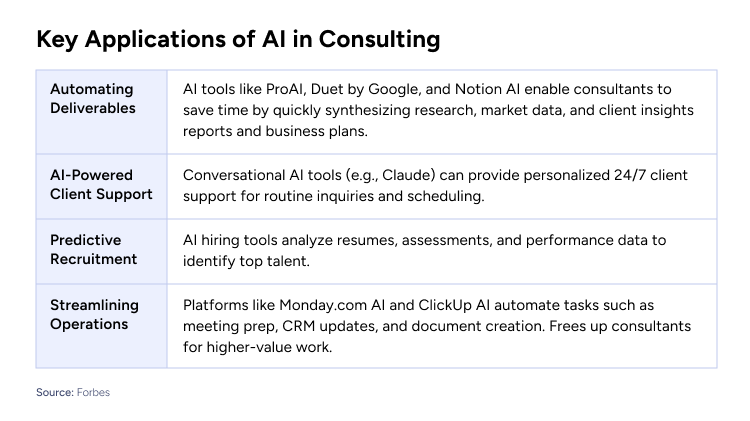
The “Where”: Where AI is Driving Growth
AI’s integration spans industries, regions, and functions within consulting, driving efficiency and innovation.
Industry and Functional Growth
Over 80% of AI consulting firms report a rising demand for their services. This growth spans multiple industries:
- Healthcare and Life Sciences: This sector accounts for 25% of all AI in consulting applications, especially for patient care innovations and medical research advancements.
- Financial Services: This sector invests $7.4 billion annually and leverages AI in consulting to improve risk management, automate processes, and provide personalized solutions.
- Retail: The adoption of AI in consulting rose by 38% last year, driven by a focus on inventory management, demand forecasting, and customer personalization.
- Specific industries such as automotive and energy are expected to see rapid adoption, with the latter projected to grow by 39% in 2025.
Specialization is also driving market trends:
- Projects focused on natural language processing (NLP) have grown by 30%.
- Demand for ethical AI and bias mitigation services has risen by 55%.
- Interest in explainable AI models has increased by 37%, reflecting the need for transparent and interpretable systems.
Regional Growth
The Asia-Pacific region is leading in regional growth, with its market set to expand the application of AI in consulting by 42% by 2025. China has the highest rate of exploring and deploying AI globally, followed closely by India and Singapore. However, when accounting only for exploration, Canada and the United States were the leading nations.
Meanwhile, Europe is experiencing significant growth, with funding for startups specializing in AI technology expected to exceed 1.4 billion EUR in 2025.
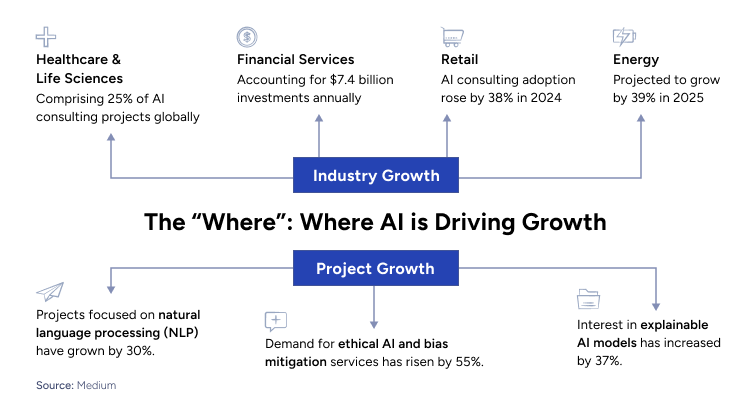
AI in Consulting Projects
The effectiveness of AI in consulting varies across multiple projects, making it challenging to pinpoint the areas with the greatest impact. However, it is valuable to assess the extent to which AI contributes, whether by enabling automation (the “what”) or enhancing human collaboration (the “how”). In particular:
Strategy Consulting
AI demonstrates significant value in strategic analysis by excelling at the “what”—automating data synthesis and pattern recognition. As highlighted in a recent Harvard Business Review (HBR) article, AI performed on par with MBA students in strategy case studies, showcasing its ability to quickly and comprehensively generate strategic insights. However, the “how,” involving human collaboration and contextual decision-making, remains a critical complement to AI's capabilities in this field.
Mergers & Acquisitions (M&A)
AI's impact on M&A projects is mixed, reflecting differences between the “what” and the “how.” On the “what” side, AI streamlines due diligence by analyzing financials and legal documents efficiently. However, the “how,” such as negotiating deals or assessing the cultural fit between organizations, requires human expertise that AI cannot replicate. As reported by McKinsey, while AI can augment specific tasks, it cannot replace the human judgment essential for navigating the complexities of M&A.
Change Management
Unlike the other areas, AI primarily enhances the “how” in change management by fostering human collaboration. Change Management Projects often struggle with a high failure rate (up to 70%), especially when implementing complex systems like cloud ERP solutions. AI addresses this by personalizing employee experiences, understanding their needs, and communicating the “why” behind the change. This focus on collaboration and engagement highlights AI’s role in supporting the human side of transformation rather than merely automating processes.
The “Who”: New Talents in the AI Era
Talent Gaps in Companies Implementing AI
As more companies prioritize data-driven decision-making, the demand for skills and resources in data management, analytics, and AI has surged. 42% of organizations report that lacking skills and resources is one of the biggest challenges to their data programs. Moreover, a survey by Deloitte revealed that 68% of executives reported moderate-to-extreme gaps in AI skills within their companies.
This shortage is particularly problematic as AI adoption is rising, and will require both upskilling and reskilling:
- A report by IBM shows that 40% of the global workforce will require reskilling in the next three years due to AI and automation.
- 60% of respondents in research conducted by the Drexel University Center for Business Analytics in 2024 reported that a lack of AI skills and training is a major challenge for launching AI initiatives, emphasizing the need for businesses to prioritize reskilling.
Keep Pace with New AI-related tasks with Independent AI Consultants
To address growing AI skills gaps, companies increasingly turn to consulting firms for external expertise. However, consulting companies must keep pace with emerging AI-related jobs highlighted in LinkedIn's 2024 Jobs on the Rise report:
- AI and Machine Learning Engineers have seen a 74% annual growth rate.
- Data Scientists are among the most sought-after roles, with a 35% year-on-year increase in job postings.
- AI Product Managers and AI Trainers are emerging roles as companies seek to integrate AI into existing workflows.
Moreover, according to Consultport’s Freelance Consultant Guide 2024, the demand for AI and cybersecurity experts increased by more than 50% in the last two years. This is prompting organizations and consultancies to seek flexible, on-demand consulting services: 51% of all freelancers provide knowledge services such as computer programming, IT, and management consulting.
Here’s where Consulting Platforms like Consultport come in. Consultport provides on-demand access to pre-vetted top-tier management consultants, digital experts, and interim managers, allowing consulting firms to augment their staffing pools and sell more projects.
In particular, Consultport provides access to independent AI specialists with expertise spanning AI ethics, data architecture, and algorithm development. Independent consultants offer a practical, cost-effective solution, enabling consulting firms to access the skills required for high-demand roles quickly. By partnering with Consultport, firms can quickly onboard independent consultants with specialized AI expertise within 48 hours.
Want to know more? Find a consultant with Consultport.
on a weekly basis.

